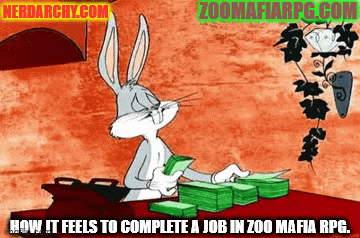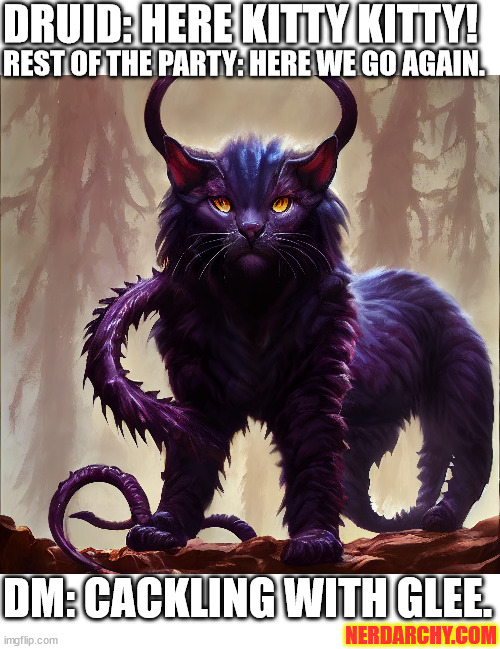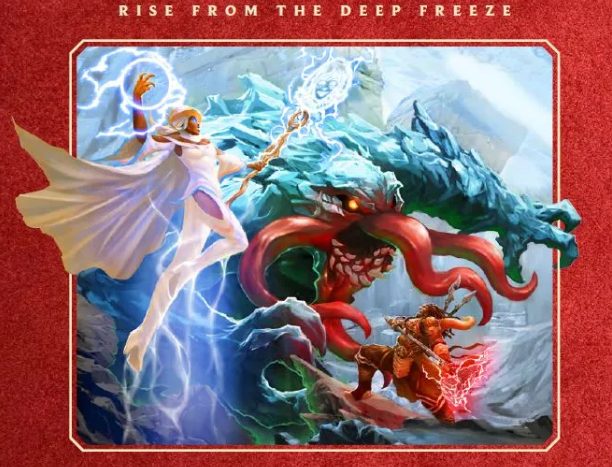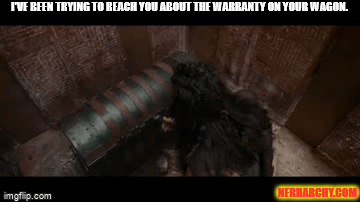
How Hogfather and Terry Pratchett’s Discworld Offer Hope for 2021 and Beyond
Recently on our second channel Nerdarchy Live Nerdarchist Dave and Nerditor Doug talked about comedy in tabletop roleplaying games. Since I’ve written my own comedic fantasy book and the genre niche is my jam I simply had to talk about it. Talking about comedic fantasy reminds me of one of my favorite movies of all time, which also happens to be a holiday favorite, Hogfather. Or as I like to call this movie — How Death Saved Fantasy Christmas.
The Hogfather story in a nutshell
For those who aren’t aware Hogfather is a movie adaptation of Sir Terry Pratchett’s comedic fantasy book by the same name. And while the book and movie alike call out Hogswatch’s similarities with Christmas there’s so much more to this movie than holiday cheer. In fact I’d argue this underappreciated gem of a movie comments on many fundamental reasons why we play RPGs and lessons we can all take with us into 2021. Obviously because we’re deep diving into themes of this movie and book there be spoilers ahead. Ye be warned.
The story begins on Discworld, Terry Pratchett’s most famous of fantasy worlds. On Discworld magic is another day job and wizards practice their bumbling arts within the walls of the Unseen University. Thieves and assassins gather in legalized guilds provided they fill out the proper paperwork.
This particular narrative takes place on the Eve of Hogswatch, a magical holiday that “bears striking resemblance” to our Christmas. During Hogswatch the Hogfather flies all over the Discworld delivering presents to boys and girls who have been good this year. Children leave pork pies and glasses of sherry for the Hogfather, which he eats and leaves a few crumbs to let them know he arrived.
On the particular Hogswatch in question the story opens on the Guild of Assassins. A new client breaks into the building to speak with the guildmaster. The clients are the Auditors, cosmic observers of time and humanity.
They conscript the guild to kill the Hogfather. This is no small feat according to the guildmaster. The Auditors leave and Mr. Teatime (prnounced tay-AH-tem-EE) is introduced. He’s a childlike man with a high voice and one completely darkened eye. Teatime is tasked with killing the Hogfather “with elegance guaranteed.”
The next scene is a small urban home of an upper middle class family having a holiday party. The couple have two children who are nannied by another main character and Discworld veteran named Susan. During the party Susan deals with monsters under the bed and in the basement, which both turn out to be real. Susan tucks in the children for the night and the story cuts to a seedy tavern where Teatime has gathered his new cohorts.
Susan goes to her grandfather’s home where she learns the sun won’t rise if the Hogfather doesn’t complete his rounds.
The story then cuts to the realm of Death and he finds something is amiss. It seems the Hogfather’s time is running out and this is no good for anybody. Death takes the hourglass for the Hogfather and heads to Earth where he informs Susan, who happens to be his granddaughter, of the Hogfather being in danger.
Meanwhile Teatime’s group departs and kidnaps a tooth fairy (not THE tooth fairy, as this is a collaborative effort). They then find the tooth fairy’s ride home. After learning the secret to breaking into the tooth fairy’s castle Teatime dispatches the driver. They then arrive at the tooth fairy’s castle and pile all of the living children’s teeth in the middle of the entryway. Teatime then has one of his gangsters, a defunct wizard, perform ancient magic on the teeth to allow a person with a tooth, nail clipping or some other shred of the body to command the person it came from. With this Teatime aims to command all the children to stop believing in the Hogfather.
When this happens spare belief exists and calls into being new mythological creatures like an eater of socks and the Verruca Gnome. Another new creature is the god of hangovers,who meets Susan during her quest to save the Hogfather.
Meanwhile Death and his assistant Albert masquerade as the Hogfather and his loyal pixie servant. Death delivers gifts, makes public appearances and begins to learn the Hogfather is more constrained than first thought. Apparently the Hogfather gives rich children expensive toys and poor children cheap toys all to maintain the socioeconomic status quo. This makes no sense to Death who is the epitome of fairness as he comes for everyone.
As the Hogfather, Death begins giving posh gifts to all children and resurrects a dead child frozen on the streets with cold. In this moment, he delivers one of my favorite lines.
“The best present is a future.”
Death continues involving himself in shenanigans and Susan makes her way to the tooth fairy’s castle. There she has a showdown with the villains and wins handily. She meets the tooth fairy but something isn’t right. She sees through the illusion. The tooth fairy is in fact a bogeyman. Or rather THE bogeyman — the first one.
It’s here we learn mythological creatures grow and evolve, sometimes filling new roles as belief ebbs and flows. Susan realizes this is how Death has prevented the Hogfather from being destroyed. Death reverted the Hogfather to his previous incarnation — a boar that must be sacrificed for the sun to rise again.
She races to a nearby forest and finds the Hogfather as a giant boar running from a pack of wolves. These are no ordinary wolves. They are the Auditors in disguise. Having observed the defeat of their assassin they’ve decided to break the rules and interfere directly with him.
Death and Susan pursue them and Death faces the Auditors in one of the most epic fantasy showdowns without an army involved. The auditors are defeated and thrown from a cliff but it’s too little, too late. The Hogfather is dead, having spilled his blood on the fallen snow.
As Susan mourns over the boar’s body he transforms into a minimally clothed Hogfather once more. That’s right! His death was all part of the plan. As a deity previously representing sacrifice he had to die for the sun to rise.
The Hogfather reclaims his sleigh pulled by boars and as he flies off while Susan and Death converse. Susan asks why Death did what he did and Death explains humans need fantasy to be human. It is the belief in something beyond themselves that makes humanity interesting and provides it part of its identity. Without stories humans simply are not human.
A lesson for 2021
The Discworld is a dark place. In fact I’d argue it is Sir Terry Pratchett’s pointedly silly inserts of narrative and worldbuilding pulling the entire series out of dark fantasy and into comedy.
As an author of comedic fantasy myself I’m of the opinion dark fantasy and comedic fantasy are adjacent genres — not opposing ones. The darkness of the world offers grounding and contrast for the sillier elements. The notion of thieves and assassins legalized by bureaucracy is not so far removed from our own world and this notion in itself sucks. Those in power maintain power by making arbitrary rules and blockading change with red tape and useless wheels within wheels designed to keep little people running until they’ve exhausted themselves trying to enact a change that will never come within the confines of the system.
On top of this the Discworld itself is threatened by everything from cosmic apocalypses to said bureaucrats vying for a little more power at the expense of huge swaths of civilians. Sound familiar?
The fact is Discworld is at its core an extremely dark and gritty setting. So what could possibly set it apart as one of the icons of comedic fantasy? The answer may surprise you.
I believe it is the darkness itself supporting the comedy in such a pointed way. Comedy is a means of coping for many people but unlike escapism comedy often grounds itself in the dark or harsh realities of the world then laughs at them. Through this laughter we’re granted a unique perspective to step back and examine these elements. We see them for what they are in every sense.
This can lead to genuine ambition for change, hope for a brighter tomorrow or at the very least a mechanism through which to cope with the inevitable.
Discworld is dark, yes. It’s also silly, irreverent and poignantly philosophical. Through humor, hope and a little bit of fantasy we can cope with our bleak surroundings, find comfort in good company and inspire ourselves and others to make the world a better place. With these lessons we can enter the new year being the changes we want to see in the world.
Want to join in the discussions and catch some awesome interviews with nerds like us? Then follow Nerdarchy Live over on YouTube!









No Comments